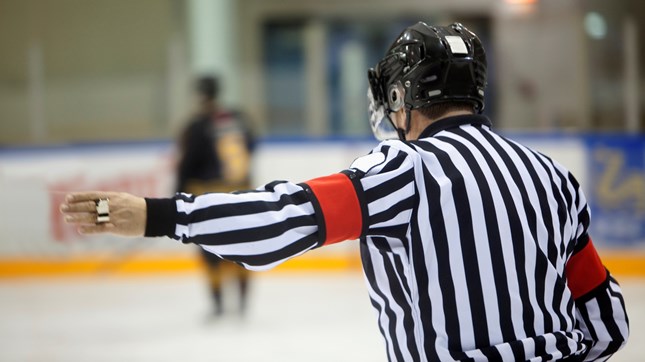Skill Builders
Article
Hockey Hiccups

The Stanley Cup Playoffs provides a perfect time for high-speed scoring and also deserved penalties. Sticks wave furiously as pucks sail through the air. Arms flailing, elbows jabbing, and fists flying are the causes of many a violent violation. The responsive official can spot these skating encroachments and call them out.
Our veteran hockey officials have assembled some of the most flagrant hockey-like hiccups that frequently occur in preaching which most often result in a stiff penalty.
High Sticking
This penalty occurs when the preacher uses information from a private counseling session as an anonymized sermon illustration the following Sunday, while the anonymous counselee sits in the congregation.
Holding
This penalty takes place when the preacher begins a third conclusion to the sermon even though the enticing odor of the after-church potluck dinner made its way into the sanctuary near the start of the second conclusion.
Hooking
This penalty happens when the preacher gets lost at any point in the sermon. They repeat themselves—again and again—and can’t seem to move on or out of the rut, hooking themself and the listeners.
Cross-Checking
This penalty occurs when the preacher harangues the congregation for five minutes when applying the sermon to a contested ethical attitude or behavior which may result in a trip to the deacon's or elder’s penalty box.
Roughing
This penalty happens post-worship service when, even though the preacher thought they preached a great sermon, more than one person tells them afterward, “Hang in there. If you keep working at it, someday you’ll be as good a preacher as our last pastor.”
Tripping
This penalty takes place when a preacher takes on a text that’s textually and theologically complicated—and hasn’t studied enough to understand it but still attempts to preach it to the congregation.
Boarding
This penalty occurs when a member of the congregation pursues the preacher to the exit door of the sanctuary arguing about a point of the sermon and the agitated preacher then traps the congregant next to the vestibule wall with a post-sermon diatribe. This penalty has led to ejection and is the reason for the absence from the pulpit.
Spearing
This violent penalty takes place when the preacher shouts harshly at the listeners, offending them to the point that they feel like they’ve been stabbed by the preacher’s words and tone.
Slashing
This penalty happens when the preacher has to cut 40-60 percent of the sermon because the personal testimony or missions-moment went 25 minutes instead of five minutes (even though the rehearsal took five minutes).
Check from Behind
After a meandering sermon, the preacher finally gets to the point of the text—almost scaring the listeners from behind as it slipped up on them, out of the fog of the sermon.
Check to the Head
This penalty occurs when the preacher uses elitist academic language that causes brain freeze for the bewildered listener.
Fighting
This common penalty occurs when at the conclusion of the sermon, listeners gather in the parking lot to clash over who can state the big idea of the sermon.
Conclusion
As preachers, we want to avoid hiccups in our sermons. The penalty for poor preaching has wide-ranging consequences for both the preacher and the listeners. Although we might spend time in the penalty box, we also know that our homiletical transgressions can be addressed by thoughtful reflection and by dealing directly with our weaknesses. When this happens, we’re better able to get onto the ice again and play the game with intention—all the while smiling but maybe with a few less teeth.










